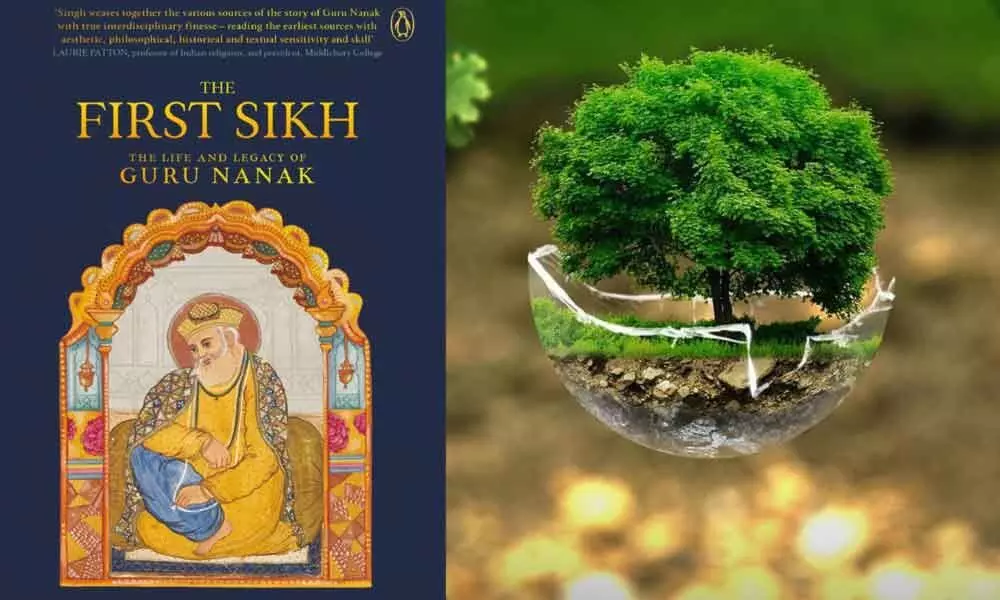The Environmentalist: Guru Nanak's ecological theology

The book ‘First Sikh’ unites rigorous scholarship with a deep love for the subject, offering fascinating insights into Guru Nanak's life and times even as it explores key facets of Sikhism. This extract is about Guru Nanak’s consanguineous relationship with nature…
With Earth's climate changing faster than ever and the oceans getting hotter and more acidic, we face the gravest environmental challenges today. 'The First Sikh' would not have been privy to our daily news reports about unprecedented hurricanes, floods, wildfires, health threats, depletion of agriculture, extinction of plant and animal species, and other such hazards. The Janamsakhi narratives primarily stage him in harmonious rural landscapes in medieval north India, and his own lyrics form serene arabesques with the natural world. Nevertheless, we discover in them some vital cures for our contemporary ecological crisis.
As Rachel Oliver from CNN says
Whether we are actively religious or not, religious belief permeates the very fabric of our existence. Namely, it influences—if not directly shapes—our legal systems; and therefore our constitutions; and therefore our nations' policy choices, both at home and abroad. I wholeheartedly think sacred texts make it to that visceral hub where external policies and rules do not quite reach. Without prescribing any rules or policies, Guru Nanak's openended melodies move us out from our narrow selves towards appreciating nature's rhythms, Earth's abundant gifts and the cosmic beauty surrounding us. His reverence for our planet is infectious. The more we read and hear him, the more we question our economic, profitmaking, capitalist attitude. But in order to tap into his literary reservoir, we must hear him attentively, and we must hear him intentionally with our twenty-first-century ears sensitive to ecological warnings. In this section, we will try to retrieve the interlinking elements of Guru Nanak's ecological theology, non-anthropomorphism, aesthetic-ontology and biophilia. By mobilizing our sensibilities in a concerted way, we could forge a meaningful relationship with nature that should help us devise and implement sustainable environmental solutions, and reverse what we have made of our planet—in Pope Francis's words, a 'wasteland full of debris, desolation, and filth'.
Ecological Theology
The few biographical facts we have about Guru Nanak's life underscore his consanguineous relationship with nature. Apparently, as a youngster, he did not like the confines of school, and opted to commune with nature. The Janamsakhis repeatedly illustrate his at-homeness in nature. We even see young Nanak grazing cows, and when he falls asleep, a cobra shades him while the sun smiles from above; in another narrative, the shade of the tree stands still while he is asleep. The terrestrial and the celestial, the spheres human, animal and vegetation, are all integrated into a harmonious whole. The Guru travelled to many different places and acquired a deep knowledge of and appreciation for the abundant diversity of flora and fauna. As we know, the first Sikh community developed in Kartarpur, the village he founded by the rippling river Ravi. Men and women who gathered around the First Sikh to hear and recite his hymns were in sync with the soil and spirit of its natural landscape. Planting, irrigating, ploughing, harvesting, rotating crops, cooking and cleaning—all with their own hands—were their daily practices. This fundamental nature orientation subsequently led to the Sikh institutions of seva (service for the larger community), langar (eating together without social segregations) and sangat (sense of fellowship).
An enchanting plurality of trees, plants, flowers, animals, birds and elements forms the script of Guru Nanak's sublime verse. It is very much with them, in them, that Guru Nanak envisions the transcendent One. His hymns like 'Barah Mah', 'Pahare' and 'Thiti' manifest the correlation between cosmic and human rhythms, physical and spiritual currents. Guru Nanak's theology does not posit 'god' above or different from the cosmos: the sole Creator creates everything, is in everything, and watches over each and all with care and joy. All of natural phenomena is the Divine's household (eco from the Greek word for household: ekos). Here we get a very different feel from that of a monotheistic notion of a Creator apart from His creation that was detected a while back by scholars in the West: 'The emphasis in Judaism and Christianity on the transcendence of god above nature and the dominion of humans over nature has led to a devaluation of the natural world and depletion of its resources for utilitarian ends.' Guru Nanak reveals this very cosmos as the dwelling place of the divine One and our life together with fellow beings, biotic or abiotic, in an interlinking web. He approves of neither Western anthropocentricism nor an instrumentalist attitude to nature. We must absorb his lyrics so we value the natural world and work together to sustain its precious wealth for future generations.
Nature is not a romantic reverie. In heartwarming ways, the First Sikh establishes a familial relationship with the environment: Air is our guru, water is known as our father The unifying womb, our Mother Earth Night and day are the two male and female nurses This is how 'You keep the play of the world playing' Guru Angad reiterates this warm kinship, and so the First Sikh's imaginary reappears twice more—as an epilogue to the Japji, and in Var Majh. Indeed, this wholistic scenario holds enormous import in Sikh scripture. The elements are our parents, without whom we would not even be here. Earth is the mother, the matrix from which we all originate, and the father is water which is approximately 80 per cent of our bodies.
The air we breathe every second is our teacher from whom we learn about our utter reliance on the infinite One, who keeps up the momentum of worldly play. Night and day are our male and female nurses who look after us. Thus, all planetary beings are children belonging to the same family. The verb 'playing' (khelai) intimates our delightful movements in the rhythmic lap of night and day—with the awareness of the infinite One each moment as we breathe (air is our guru!).
Today, our horizon darkened by the tragedies of pollution, global waste and alienation from our environment, both natural and social, the task of recognizing Guru Nanak's consanguineous relationship with nature is more urgent than ever. How can we drown our rivers, seas and lakes in chemicals, plastic, waste and other pollutants? How can we poison the air with pollutants from cars, planes, factories, power plants, refrigerants? How can we destroy fields and jungles to set up our lucrative industries and towering gated communities? We are a close-knit family.
Earth is the matrix from which we are born, from which we are created, and from which we grow, evolve and thrive. We cannot degrade her or any of our siblings. Guru Nanak shares the feminist emphasis that the mother bodies forth her child. For, in the process of giving birth, the most intimate and organic connection between mother and offspring is expressed. It is an organic relationship.
- Extracted with permission from Penguin Random House from the book 'The First Sikh' by Nikky-Guninder Kaur Singh









